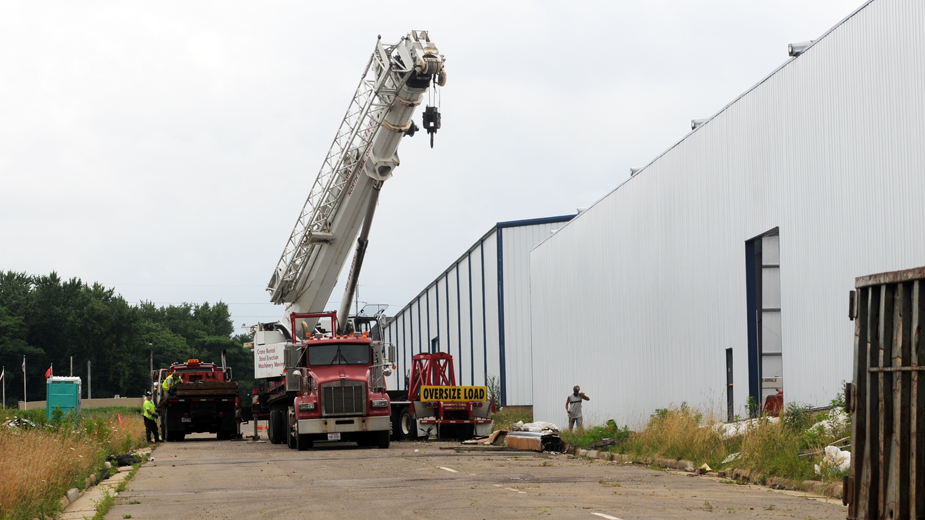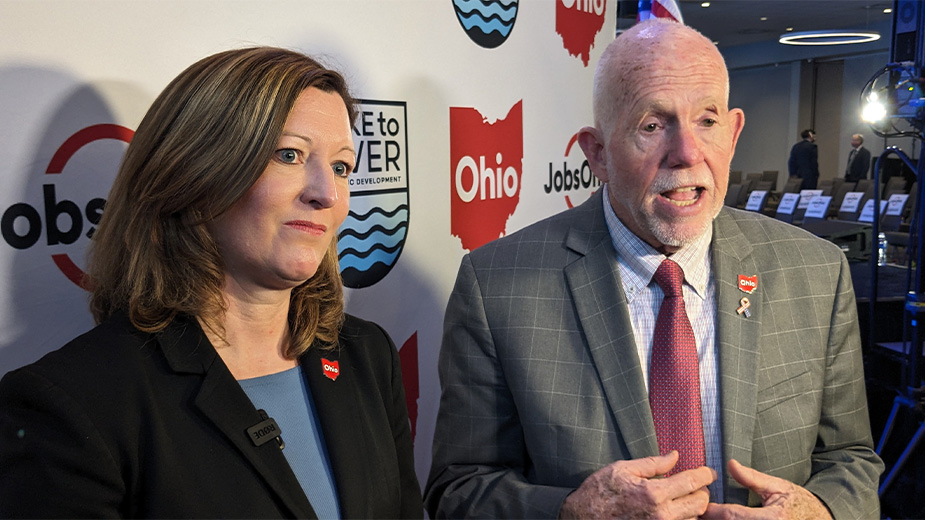Chill-Can Plant in Iowa? Says Who? Sound Familiar?
YOUNGSTOWN, Ohio – A former investment broker whose license was pulled last year for violating Ohio security laws says he’s found new financing to finish the delayed Chill-Can project on the east side of Youngstown.
And, he says, he’ll expand Chill-Can to Miami, and then build another self-chilling beverage can plant in a small town in Iowa backed with a Minnesota-based financial adviser.
Say what?
“I’ve decided to take over the whole financing part for the Joseph Co.,” asserts Garry N. Savage Sr., president of Las Vegas-based Coast to Coast Chill Inc., who says he has a financial stake in Chill-Can in Ohio and Florida.
Savage says his plan is to complete the Youngstown project first – he anticipates it could be finished in about 90 days – and then begin work on another project in the Miami area. Once the plant in Miami is finished, another would be earmarked for Estherville, Iowa.
This is all news to the Joseph Co., according to its chairman, Mitchell Joseph.
“Not true,” he states in an email. “We have envisioned Miami as a possible future site (three-plus years down the road) if and when Youngstown reached its manufacturing capacity. There are no current plans in place to do that.”
Nor will the Youngstown plant be complete in 90 days, Joseph says.
Joseph and Savage began doing business together in 2016, when Savage signed contracts in which he agreed to pay $7.5 million for the rights to the Ohio territory and another $5.8 million for Florida, according to documents obtained by The Business Journal.
Joseph Co. International, based in Irvine, California, owns the patents for what is promoted as the world’s first self-chilling beverage can. In November 2016, the company broke ground on what Joseph promised would become a $20 million production complex on Youngstown’s East Side. Two production buildings have been constructed; a third is under construction. Joseph promised 237 people would be working there by August of 2021. In return, the city awarded the company a 75% tax abatement for 10 years, provided a $1.5 million grant from its wastewater and water funds, and spent another $360,000 to acquire land and relocate the residents who lived at the site.
Not one can has been produced and only a few people have been hired.
Still, Savage insists he has big plans to provide financing to finish the Youngstown plant, expand to Miami, then build a Chill-Can plant Iowa.
A story published July 9 by the Estherville News revealed that Jeff Robinson, a Minnesota-based financial adviser and a native of Estherville, is lining up financing through a pool of investors. The financing – which would be lent directly to Savage and his Coast to Coast Chill company – is conditional upon building a Chill-Can plant in Iowa, according to the newspaper.
Joseph is emphatic regarding prospects for any project there. “We have ZERO plans to go to Estherville, Iowa,” his email states.
Savage tells The Business Journal that Coast to Coast first bought royalty rights to the Chill-Can product four years ago and today would receive a small percentage of each can sold worldwide.
“What I do is raise the money needed to finish these projects,” he says. “My company does this by buying more royalties or a state” where the Chill-Can would be sold. He equates his role to that of a McDonald’s restaurant franchisee.
“I know there were a lot of issues with Youngstown,” Savage says. “We’re putting those behind us and moving forward. The money going into the Youngstown plant is mine – it’s always been mine.”
Savage says he’s spent at least $5 million for rights to the Chill-Can product. “It’s been one thing after another [in Youngstown]. That’s why I decided to come in and take over all the financing.”
Joseph, however, says that Savage has no financial interest in the Youngstown operation and owns only the Florida license. “That is his only financial and licensee relationship with The Joseph Company,” he says.
Joseph and Savage established a business relationship after the two met through a law firm where both were clients, according to Savage.
It wasn’t long before their arrangement soured.
In June 2017, The Joseph Co. informed Savage that Coast to Coast was in default of its Ohio agreement, according to documents filed in the Superior Court of Orange County, California.
Later that month, a settlement contract was negotiated that outlined an installment schedule for Coast to Coast to pay off the Florida and Ohio master license contracts, according to court documents.
Yet by August 2017, the issue remained unresolved. That month, Joseph Co. sued Savage and Coast to Coast for breach of contract. The case was settled a month later with both entities acting as their own counsels, according to documents. Terms of the settlement were not disclosed.
By this time, however, Savage faced mounting problems of his own.
Beginning in 2016, Savage, a securities broker with offices in Huron, Ohio, and Florida, began to spar with Ohio regulators related to business conducted by two firms in which he held an interest – Wall Street Strategies Inc. and Advanced Strategies Inc.
An investigation by the Ohio Department of Commerce Division of Securities found that Savage and his companies had violated Ohio securities law on numerous occasions for failing to disclose lawsuits, arbitration awards or other actions filed against him or his firms between 2001 and 2018.
These include three arbitration cases brought against Savage and his related firms by the Financial Industry Regulatory Authority, or FINRA. The agency is a private self-regulatory organization that governs registered brokers and broker-dealer firms in the United States.
According to FINRA records, the agency in May 2017 awarded $93,857 in damages to a client of Wall Street Strategies, noting that the company was “liable on the claims of breach of contract, breach of fiduciary duty and negligence.”

Another arbitration panel in June of that year found Savage and Wall Street Strategies in violation of Florida and Ohio securities laws and awarded $557,874 to another claimant, according to FINRA records. A second arbitration case involving the same client resulted in a $769,300 judgment against Savage and his companies, according to documents.
In June 2018, Savage entered into an acceptance, waiver and consent agreement with FINRA related to other rules violations, records show. These violations included conducting business through Wall Street Strategies while the firm operated with a net capital deficiency. FINRA assessed a $30,000 fine, and in August 2018, the agency suspended Savage’s license indefinitely for failure to comply with an arbitration award.
The Ohio Division of Securities followed suit and revoked Savage’s broker’s license, finding the respondents are “not of good business repute,” according to a final order issued Dec. 6, 2019.
Savage says FINRA treated him unfairly and maintains Ohio should have never revoked his license. For example, in the larger arbitration case, he says he requested a hearing be postponed because of a medical emergency. The request was denied and the hearing went forward without his presence, he says.
“They went and awarded this client an unbelievable award without any defense from me,” Savage says. “So, I basically said. ‘I’m not paying it.’”
Savage filed a motion to vacate the arbitration decision in the 13th Judicial Circuit Court for Hillsborough County, Florida, but the motion was denied. He has since sued the client in the same court, alleging the client provided false testimony before FINRA.
Still, Savage says these setbacks haven’t stopped him from moving forward with his plans for Chill-Can and he is confident he can secure the financing necessary to complete the project in Miami and eventually Iowa.
Robinson, the Minnesota-based financial adviser who says he’s arranging new financing for the Iowa venture, tells The Business Journal that he wants to bring jobs back to his hometown of Estherville and Chill-Can presents such an opportunity.
“It’s a good project,” he says. “I believe in it.”
What struck Robinson most about the project is that the self-chilling technology has applications that transcend beverage cans. “Major companies have tried to buy Joseph’s patents, the U.S. government is interested in this,“ Robinson says. “That in itself will make it work.”
Savage says he also sees potential beyond the beverage industry, especially the development of self-chilling canteens for the military. “That could be done in Youngstown,” he says.
Meanwhile, work continues on the third building at the Youngstown site, as contractors put the finishing touches on the metal skin and begin work on the roof. Joseph initially envisioned production starting in 2018. But the timeline has consistently been pushed back.
Mayor Jamael Tito Brown says he stays in regular contact with Joseph and is optimistic about the project despite its setbacks. “He’s been adamant,” Brown says. “He’s not ducked any calls and has been up front with me.”
Nor has Brown put pressure on Joseph to fast track the project, he says, although he acknowledges the development has missed its benchmarks.
“The more time lags, the more citizens get antsy,” he says. “These are great jobs and these are great opportunities.”
Pictured at top: A crane and a few equipment operators are the only workers at the Chill-Can site July 23.
Copyright 2024 The Business Journal, Youngstown, Ohio.



